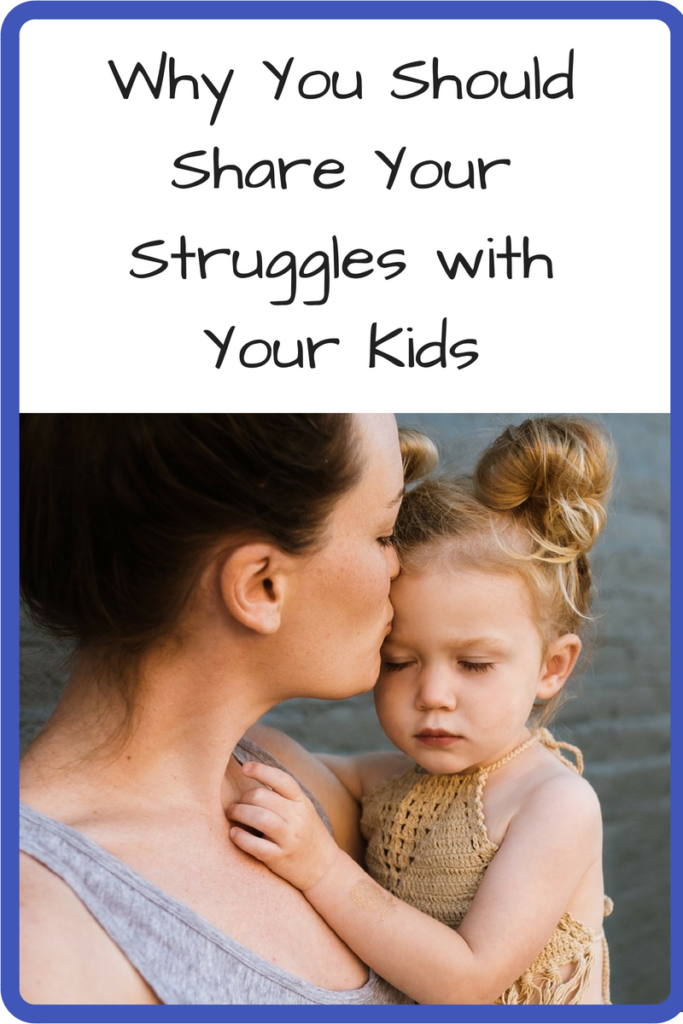
“Let’s remind each other to be positive and flexible this trip,” I told my four-year-old the day before going on vacation.
“What’s flexible mean?” he asked.
“Being willing to change plans. It’s something I’m working on. We both need to help each other out, okay?” I responded.
That’s neither the first or last time that I’ve told my kids about my own struggles. Some parents may feel like admitting to mistakes or challenges decreases their authority, but I think it actually does the opposite. We shouldn’t dump on our kids or reveal more than they can handle, but discussing issues at an age-appropriate level can be valuable. Thankfully, talking about this a little bit can go a long way.
Here are some of the benefits:
Creates mutual open-heartedness
Brene Brown, psychologist and queen of research into vulnerability, has written extensively on the importance on being “open-hearted.” That means sharing who you truly are with people, even and especially when it’s scary.
Besides the fact that being honest is good for our internal landscape, it also inspires honesty from others. When a friend shares something scary and vulnerable, you’re more likely to share something similar with them in the future.
The same goes for our kids. If we share a little bit of our struggles, they’ll feel safe enough to share theirs without fear of reprisal or judgement. My preschooler has zero problems sharing all of his Big Feelings right now, but that won’t always be true. The connections we’re creating now are laying the foundation for our relationship when our kids are preteens and teenagers. It also creates an “we’re all in this together” bond.
Builds credibility and trust
Trust comes from two major factors: judging that someone is competent and that they want good things for you. Obviously, we hope our kids know that we mean them well!
But we often take the fact that our kids see us as competent for granted. Little kids see parents as all-knowing, but that illusion disappears faster than we’d like to admit. It becomes clear pretty quickly that we make mistakes!
Unfortunately, if we try to hide our mistakes, kids feel like we don’t trust them. (They can see through that crap a mile away.) In contrast, if they see parents working to be better people, they’ll be more likely to see us as credible. You’d rather learn from someone who has gained their knowledge from experience than someone who seems to magically know everything, right? Plus, those people are annoying.
Models emotional health and growth
“Do as I say, not as I do” works as well for emotional health as it does anything in parenting. Not at all!
If we get mad at our kids when they get upset, we’re showing them it’s okay for adults to get mad but not kids. On the flip side, if we never show any of our struggles or how we’ve handled them, they won’t realize it’s okay to have those struggles and ask for help. Sharing a little bit of our challenges as well as how we’ve grown over time can model good mental and emotional health for our kids.
This is especially important if you have a history of depression, anxiety or addiction in your family. Pretending these issues don’t exist can make them much worse. In contrast, if your child knows that you are getting help, it can destigmatize it and make it easier for them to get help if needed it.
Builds empathy for others
Empathy is based on the ability to see things from another person’s point of view. But it’s hard to develop it if no one reveals that point of view to you. Kids often don’t get to truly hear what it’s like to be an adult. In contrast, helping kids see a little bit of what’s going on in your own head can expand their perspectives.
Helps them feel less alone
As a kid, I had a lot of struggles with making friends. Reading social cues and not dominating conversations seemed impossible. I also felt like I was the only person in history to feel that way. (Spoiler alert: I was not.)
The whole situation felt particularly difficult because it seemed like my parents had never faced these problems. My mom is a big extrovert – she voluntarily starts conversations with random strangers on a regular basis. Although my dad is quiet, he has a natural likeableness. While they did the best they could to support me, I wish I could have known an adult who had dealt with these issues and come out the other side.
Makes it possible to share tactics
No one likes being told what to do. Especially kids, who are told what to do all day long. Sharing a little of our challenges can also help us share a few of the tactics that we use to get through them. Instead of framing advice to our kids as “You must/should do this,” you can frame it as “This worked for me.” Personally, I know I’m always more willing to listen to the latter!
In our house, I recently shared with my son the idea that focusing on what I’m looking at, hearing, and physically feeling helps me calm my mind. He seemed much more amenable to this tactic than other ideas I had previously suggested.
While we had our share of preschooler meltdowns on the trip, I’m still glad we had that little talk. Obviously, I calmed him down a whole heck of a lot more than he calmed me, but just sharing that little challenge meant a lot.
For more on mental health and kids, check out How Parents Can Help Prevent Toxic Anger. For thought-provoking articles and posts, be sure to follow us on Facebook.
Great article